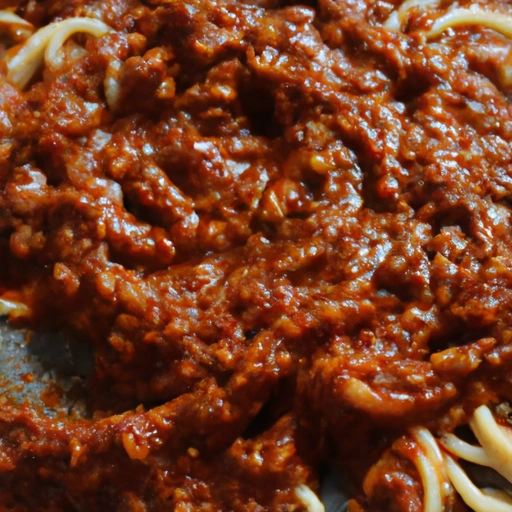Spaghetti Sauce
Description

Spaghetti sauce, also known as pasta sauce or marinara sauce, is a flavorful condiment frequently used in a variety of dishes. It is traditionally made from a tomato base, which is simmered with an assortment of herbs, spices, and sometimes includes meat or vegetables. The sauce is known for its robust flavor, slightly tangy and sweet taste, and its smooth yet sometimes chunky texture.
Common uses
Spaghetti sauce is primarily used as a topping for pasta dishes, yet its versatility allows for its use in many other culinary applications. It can serve as a base for pizzas, a dipping sauce for appetizers, a stewing sauce for proteins, and even as a flavorful addition to soups and chilis.
Nutritional value
Calories
A typical serving of spaghetti sauce (about 1/2 cup or 125 ml) contains approximately 70 to 90 calories.
Protein
Spaghetti sauce provides about 2 to 3 grams of protein per serving, depending on the inclusion of meat or other protein-rich ingredients.
Fat
The fat content in a serving of spaghetti sauce can vary from 1 to 5 grams, largely based on whether it is a meat-based or vegetarian sauce.
Carbohydrates
Carbohydrates in spaghetti sauce primarily come from the tomatoes and any added sugars, totaling around 12 to 18 grams per serving.
Vitamins
Tomato-based spaghetti sauce is a good source of vitamins A and C, while also providing some B vitamins, depending on the specific recipe and ingredients used.
Minerals
The sauce contains minerals like potassium and iron, with amounts varying based on the ingredients incorporated into the sauce.
Health benefits
Rich in vitamins and antioxidants, especially from tomatoes, spaghetti sauce can contribute to heart health and help protect against certain types of cancers. The fiber from the vegetables used can aid in digestion and promote satiety.
Potential risks
Store-bought spaghetti sauce may have high levels of sodium and added sugars, which can pose health risks if consumed in excess. Homemade sauces allow for better control of these ingredients.
Common recipes
Common recipes using spaghetti sauce include classic spaghetti and meatballs, lasagna, stuffed peppers, and eggplant Parmesan.
Cooking methods
Spaghetti sauce can be simmered on the stove, cooked in a slow cooker, or even made in a pressure cooker to blend and intensify the flavors.
Pairing with other ingredients
This sauce pairs well with a variety of pasta shapes, from spaghetti to penne, and complements proteins such as chicken, beef, and seafood.
Summary
Spaghetti sauce is a versatile and widely used ingredient that elevates a multitude of dishes with its rich, complex flavors. Whether used in a simple weeknight dinner or a more elaborate dish for a special occasion, spaghetti sauce is a beloved staple in cuisines around the world.